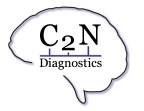Dr. Tim West, Ph.D. Presented the Study Results at the 12th Annual Clinical Trials in Alzheimer’s Disease (CTAD) conference in San Diego, CA
- Dr. Tim West, Ph.D. Presented the Study Results at the 12th Annual Clinical Trials in Alzheimer’s Disease (CTAD) conference in San Diego, CA
- Results Show that the APTUS™-Aβ Test Strongly Predicts the Presence of Brain Amyloidosis in a Diverse Population
ST. LOUIS--(BUSINESS WIRE)-- C2N Diagnostics today announced that results from a study of the APTUS™-Aβ blood test showed high performance for identifying presence or absence of Alzheimer’s pathology in the brain. The APTUS™-Aβ blood test measures amyloid beta proteins from a single sample of blood. The study showed that this blood test reliably predicts the presence or absence of brain amyloid, an essential and early marker of Alzheimer’s disease. Dr. Tim West, Vice President of Research & Development for C2N Diagnostics reported the results as part of a Late Breaking Session at the 12th Annual CTAD conference, held Friday, December 6, 2019 in San Diego, CA.
In the study, C2N applied the APTUS™-Aβ blood test to 415 samples previously collected from individuals enrolled at six different locations across the United States. Despite differences in how each of the sites previously collected and stored the blood samples, as well as how each site defined presence of amyloid in the brain, the results showed that the APTUS™-Aβ blood test yielded an area under the receiver operator curve (ROC-AUC) performance of 0.86. When the APTUS™-Aβ results were combined with age and presence of the ApoE4 gene, a known genetic risk factor for developing Alzheimer’s disease, the overall test performance increased to an AUC of 0.90.
“We are extremely excited about the results from this study showing a high degree of agreement between our blood test and the established, more invasive and costly methods of detecting brain amyloidosis,” stated Dr. Joel Braunstein, CEO of C2N Diagnostics. “With the diversity in how samples were handled and stored at the different sites, we believe that standardizing sample collection and amyloid definition can lead to an even higher level of performance than what we found in this proof-of-concept study. We are delighted that the robustness of the APTUS™-Aβ blood test allowed us to reliably measure the analytes in these samples.”
C2N Diagnostics has completed the collection of blood samples from individuals enrolled in their PARIS study. These patients have received amyloid PET imaging as part of the IDEAS study. The blood samples will be used for validating the APTUS™-Aβ test against subjects’ amyloid PET images. Results from this study will be forthcoming. C2N received a Breakthrough Device Designation from the FDA for the APTUS™-Aβ blood test and expects to seek approval for the test as an in vitro diagnostic, based in part on data from PARIS and other studies. C2N is also preparing to soon launch a CLIA version of the test. “We realize the urgency for developing a reliable blood test that will help identify individuals with early Alzheimer’s pathology,” stated Dr. Braunstein. “This test will come at a much lower cost and hassle than existing methods of detecting brain amyloidosis. This should facilitate a physician’s ability to properly diagnose his or her patients who present to the clinic with new memory complaints. It should also identify more people who are eligible to participate in clinical trials testing new drugs in development for Alzheimer’s prevention and treatment.”
Development of the test has been funded partially by the NIH and the BrightFocus Foundation.
About APTUS™-Aβ
The APTUS™-Aβ blood test is an in vitro diagnostic under development for predicting amyloid PET scan results. It combines the blood concentration of amyloid beta (Aβ) isoforms Aβ42 and Aβ40, as measured by mass spectrometry. C2N has shown that a lower plasma Aβ42/Aβ40 ratio correlates with brain amyloidosis determined by amyloid PET scans as well as other methods. Amyloid PET scans accurately detect amyloid plaques – one of the hallmarks of Alzheimer’s Disease – and are used in the work up and management of people with cognitive impairment who are being evaluated for Alzheimer’s disease and other causes of cognitive decline.
About Alzheimer’s Disease
Alzheimer's Disease is a progressive, neurodegenerative disorder that leads to cognitive decline and dementia. It affects approximately 5.7 million people in the United States and 34 million people worldwide, with many millions more at risk. The patient population for Alzheimer’s Disease is expected to nearly triple by 2050. It is the sixth leading cause of death in the U.S. and there are currently no treatments to prevent or delay disease progression.
About C2N Diagnostics
C2N Diagnostics, LLC (www.c2ndiagnostics.com) was formed by scientific co-founders Drs. David Holtzman and Randall Bateman of Washington University School of Medicine in St. Louis, MO and LifeTech Research, a technology research and venture development firm. C2N is commercializing a suite of biomarker tests to enable drug development and early detection of debilitating neurodegenerative disorders before symptom onset. The company's products include the SILK-Aβ® Assay, which rely upon stable isotope labeling and mass spectrometry for the measurement of in vivo metabolism, and quantitation of brain derived proteins. The company has leveraged this expertise in mass spectrometry and amyloid proteins to develop the APTUS™-Aβ blood test, a highly sensitive method for measuring amyloid beta peptides in blood samples. The APTUS™ platform can be used to predict brain amyloid pathology from a single blood sample. In early 2019, C2N was granted Breakthrough Device Designation for the APTUS™-Aβ test from the US-FDA for this technology, and the company is working towards clinical validation and commercialization of the test. In addition to the diagnostic efforts, C2N has developed a portfolio of anti-tau antibodies (including ABBV-8E12) for the treatment of Alzheimer’s Disease and other neurological disorders, and in March 2015 C2N formed a global partnership with AbbVie to develop and commercialize these antibodies.
View source version on businesswire.com: https://www.businesswire.com/news/home/20191209005238/en/
Contacts
Tim West, Ph.D.
V.P. of Research and Development | C2N Diagnostics
twest@c2ndiagnostics.com
Source: C2N Diagnostics






